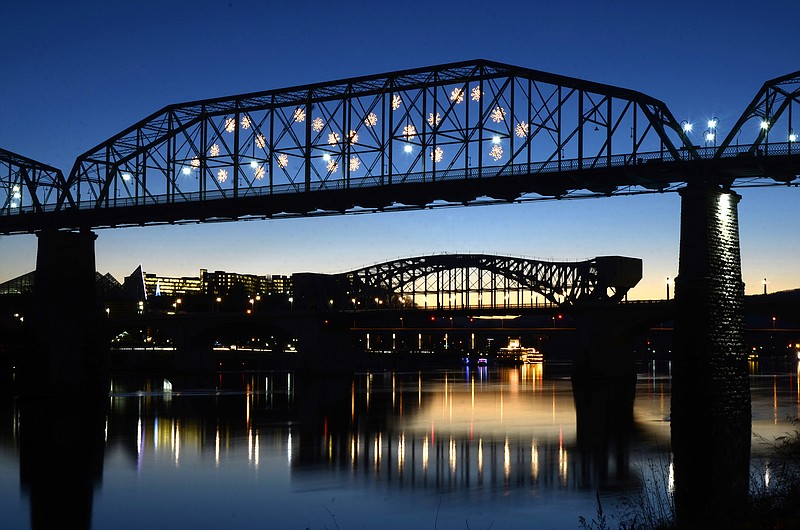A fancy, $4 million lighting project downtown may be a bridge too far for Chattanooga City Council members, who abruptly declared Tuesday they aren't ready to vote on the scheduled first reading of the city budget June 19.
Council members dug in their heels over a budget that would spend $2 million of city tax money and $2 million more from donors to light the Walnut Street Bridge, compared to $6 million for paving needs in the entire city, and that would raise water quality and sewer fees for residents one year after both Chattanooga and Hamilton County boosted property tax rates.
What’s next
› June 12: A public hearing on the proposed FY 2018-19 budget will be held at 6 p.m. in the city council chamber.› June 19: Council scheduled to vote on first reading› June 26: Second-reading vote scheduled
"I personally have serious issues with the way the budget is laid out," council Chairman Ken Smith said toward the end of the body's budget education session on Tuesday.
Other members also voiced concerns about Mayor Andy Berke's proposed $273 million capital and general fund spending plan for the fiscal year that starts July 1.
"I'm confused and uneasy about this," Councilwoman Demetrus Coonrod said, noting that her district and other areas of the city need the basics for residents, such as affordable housing and street paving.
"The mayor needs to get his priorities together, because this isn't working for me," Coonrod said.
In fact, Berke has proposed creating a $1 million Affordable Housing Fund to leverage money for moderate and low-income residents, as well as a $1 million Neighborhood Reinvestment Fund to encourage local business growth.
The council has been having department-by-department budget presentations for three weeks. Members spent a lot of time at Tuesday morning's session on the capital budget discussing the Walnut Street Bridge lighting, including the Berke administration's plan to raise half the cost from private sources.
Members were uneasy when city staff said the Lyndhurst and Benwood foundations have expressed interest but haven't actually committed to sharing the cost.
Councilman Darrin Ledford said the budget has "millions and millions in external money being dropped in" for various projects, including the bridge, and asked who will pay if the funding promises fall through.
"In fact, the taxpayers will be on the hook if the private sector doesn't come through? I think the answer is yes," Ledford said.
That's not likely to happen, city staff said.
"We wouldn't plan on that external funding if we didn't have confidence in our external funding partners," said Justin Steinman, the city's strategic capital planning manager, who was doing the capital budget briefing.
The bridge lighting plan is separate from an overall renovation of the historic span, which will get $5 million in funding in the coming year.
In response to Councilman Chip Henderson asking why the lighting question can't be decided later, city staff said the lighting design must be taken into account in the bridge makeover. And they said they didn't know how much to budget for future maintenance and upgrades because the design isn't complete.
"We don't have an idea how much these lights are going to cost us year after year? I think that's important to consider as well," Henderson said.
The council spent so much time on some parts of the capital budget, it didn't have time to talk in-depth about the proposed increase in water quality fees. The city's Stormwater Regulations Board has recommended raising the present $115.20 annual fee for an average home by nearly 10 percent per year for the next five years for water quality projects, from around $22 million now to $33 million in 2023.
That's separate from a scheduled increase of nearly 10 percent in sewer fees from the present $46.35 a month for the average homeowner, which will take effect July 1.
Chattanooga also raised property taxes last year to put about $23 million more into public safety and other city needs. The city also adopted a property tax freeze for senior citizens, but Henderson said Tuesday the rising water quality fee would just about wipe out any savings from the tax freeze for many.
"I'm just not prepared to approve a budget that includes an increase on our taxpaying citizens," he said.
"I agree, I'm kind of disappointed in what I'm seeing right now," said Councilman Darrin Ledford.
Finance Chairman Carol Berz, who has organized the budget education sessions, said the council still hasn't gotten to issues including transportation, housing, funded agencies or the city's plan to take over case management for Berke's focused deterrence initiative against gang violence, among other topics. Another budget education session is set for June 12.
Meanwhile, council members agreed to ask City Attorney Wade Hinton to prepare a continuing resolution to keep the city operating at current budget levels into the new fiscal year, if needed.
Finance Administrator Daisy Madison said she can't remember a time when the budget wasn't approved before July 1 except for last year, when it was delayed by the countywide property reappraisal process.
Maura Sullivan, Berke's chief operating officer, said city staff members have been part of the education process for the council during the budget process.
"While we do want council to have all the benefit of being able to have their questions answered, we also must run the people's government and believe that the process has afforded enough time, but we stand ready to continue to answer questions as they come forward," Sullivan said.
Contact staff writer Judy Walton at jwalton@timesfreepress.com or 423-757-6416.
